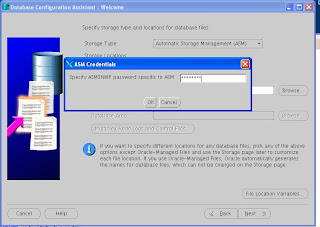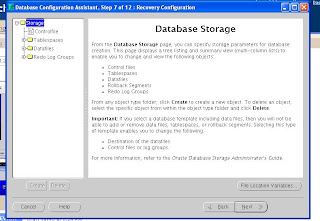This article describes step-by-step installation of Oracle 11g R2 database software on RedHat Enterprise Linux 5.
Step 1: This article will instruct how to install Oracle Grid infrastructure 11g R2 for stand alone server in Linux environment.
Verify System Requirements :
grep MemTotal /proc/meminfo(minimum required RAM is 1.5 GB for Oracle Grid Infrastructure for a Cluster)
grep SwapTotal /proc/meminfo(minimum required swap space is 1.5 GB)
Pre-Instalation Tasks:
Log in as root and create grid user account which belongs to dba group.
[root@oral01 ~]# useradd -m -s /bin/ksh -g dba -u 1001 grid
mkdir -p /u01/app/11.2.0/grid
[root@oral01 results]# mkdir -p /u01/app/grid
[root@oral01 results]# chown -R grid:dba /u01/app/grid
[root@oral01 results]# mkdir -p /u01/app/11.2.0/grid
[root@oral01 results]# chown -R grid:dba /u01/app/11.2.0/grid
Add the following lines to the /etc/security/limits.conf file:
oracle soft nofile 131072
oracle hard nofile 131072
oracle soft nproc 131072
oracle hard nproc 131072
oracle soft core unlimited
oracle hard core unlimited
oracle soft memlock 3500000
oracle hard memlock 3500000
ASMLib 2.0 is delivered as a set of three Linux packages:
■ oracleasmlib-2.0 - the Oracle ASM libraries
■ oracleasm-support-2.0 - utilities needed to administer ASMLib
■ oracleasm - a kernel module for the Oracle ASM library
Configure oracleasm :
[root@oral01 tmp]# /etc/init.d/oracleasm configure
Configuring the Oracle ASM library driver.
This will configure the on-boot properties of the Oracle ASM library
driver. The following questions will determine whether the driver is
loaded on boot and what permissions it will have. The current values
will be shown in brackets ('[]'). Hitting <ENTER> without typing an
answer will keep that current value. Ctrl-C will abort.
Default user to own the driver interface []: grid
Default group to own the driver interface []: dba
Start Oracle ASM library driver on boot (y/n) [n]: y
Scan for Oracle ASM disks on boot (y/n) [y]:
Writing Oracle ASM library driver configuration: done
Initializing the Oracle ASMLib driver: [ OK ]
Scanning the system for Oracle ASMLib disks: [ OK ]
[root@oral01 tmp]# oracleasm createdisk ASM1 /dev/sdc1
Writing disk header: done
Instantiating disk: done
[root@oral01 tmp]# oracleasm listdisks
ASM1
Linux x86-64 Oracle Grid Infrastructure and Oracle RAC Package Requirements :
########from oracle documentation###################
The following packages (or later versions) must be installed:
Note: Starting with Oracle Grid Infrastructure11g Release 2
(11.2), all the 32-bit packages listed in the following table, except
for gcc-32bit-4.3, are no longer required for installation. Only the
64-bit packages are required. However, for Oracle 11g release 1
(11.2.0.1), both the 32-bit and 64-bit packages listed in the
following table are required.
binutils-2.17.50.0.6
compat-libstdc++-33-3.2.3
compat-libstdc++-33-3.2.3 (32 bit)
elfutils-libelf-0.125
elfutils-libelf-devel-0.125
gcc-4.1.2
gcc-c++-4.1.2
glibc-2.5-24
glibc-2.5-24 (32 bit)
glibc-common-2.5
glibc-devel-2.5
glibc-devel-2.5 (32 bit)
glibc-headers-2.5
ksh-20060214
libaio-0.3.106
libaio-0.3.106 (32 bit)
libaio-devel-0.3.106
libaio-devel-0.3.106 (32 bit)
libgcc-4.1.2
libgcc-4.1.2 (32 bit)
libstdc++-4.1.2
libstdc++-4.1.2 (32 bit)
libstdc++-devel 4.1.2
make-3.81
numactl-devel-0.9.8.x86_64
sysstat-7.0.2
unixODBC-2.2.11
unixODBC-2.2.11 (32 bit)
unixODBC-devel-2.2.11
unixODBC-devel-2.2.11 (32 bit)
rpm -q binutils compat-libstdc++ elfutils gcc glibc libaio ksh libgcc libstdc++ \
make sysstat unixodbc
Add following kernal parameters in /etc/sysctl.conf file.
kernel.shmall = 1073741824
kernel.msgmni = 2878
kernel.msgmax = 8192
kernel.msgmnb = 65536
kernel.sem = 250 32000 100 142
kernel.shmmni = 4096
kernel.shmall = 1073741824
kernel.shmmax = 4398046511104
net.core.rmem_default = 262144
net.core.rmem_max = 4194304
net.core.wmem_default = 262144
fs.aio-max-nr = 3145728
vm.swappiness = 5
fs.file-max = 6815744
net.ipv4.ip_local_port_range = 9000 65500
net.core.wmem_max = 1048576
Login as the grid user and add the following lines .profile :
#########################################
export VISUAL=vi
export EDITOR=/usr/bin/vi
ENV=$HOME/.kshrc
export ENV
umask 022
stty erase ^?
export HOST=`hostname`
export PS1='$HOST:$PWD>'
export PS2="$HOST:`pwd`>>"
export PS3="$HOST:`pwd`=="
ORACLE_BASE=/u01/app/grid; export ORACLE_BASE
export GRID_HOME=/u01/app/11.2.0/grid
export PATH=$PATH:$HOME/bin:$GRID_hOME/bin
unalias ls
#########################################
Installation:
oral01.ukatru.com:/home/grid>export DISPLAY=192.168.2.152:0.0
oral01.ukatru.com:/u01/app/grid/grid>./runInstaller
Starting Oracle Universal Installer...
Checking Temp space: must be greater than 120 MB. Actual 13182 MB Passed
Checking swap space: must be greater than 150 MB. Actual 2495 MB Passed
[root@oral01 ~]# /u01/app/oraInventory/orainstRoot.sh
Changing permissions of /u01/app/oraInventory.
Adding read,write permissions for group.
Removing read,write,execute permissions for world.
Changing groupname of /u01/app/oraInventory to dba.
The execution of the script is complete.
[root@oral01 ~]# /u01/app/11.2.0/grid/root.sh
Running Oracle 11g root.sh script...
The following environment variables are set as:
ORACLE_OWNER= grid
ORACLE_HOME= /u01/app/11.2.0/grid
Enter the full pathname of the local bin directory: [/usr/local/bin]:
Copying dbhome to /usr/local/bin ...
Copying oraenv to /usr/local/bin ...
Copying coraenv to /usr/local/bin ...
Creating /etc/oratab file...
Entries will be added to the /etc/oratab file as needed by
Database Configuration Assistant when a database is created
Finished running generic part of root.sh script.
Now product-specific root actions will be performed.
2011-02-06 17:03:09: Checking for super user privileges
2011-02-06 17:03:09: User has super user privileges
2011-02-06 17:03:09: Parsing the host name
Using configuration parameter file: /u01/app/11.2.0/grid/crs/install/crsconfig_params
Creating trace directory
LOCAL ADD MODE
Creating OCR keys for user 'grid', privgrp 'dba'..
Operation successful.
CRS-4664: Node oral01 successfully pinned.
Adding daemon to inittab
CRS-4123: Oracle High Availability Services has been started.
ohasd is starting
oral01 2011/02/06 17:03:42 /u01/app/11.2.0/grid/cdata/oral01/backup_20110206_170342.olr
Successfully configured Oracle Grid Infrastructure for a Standalone Server
Updating inventory properties for clusterware
Starting Oracle Universal Installer...
Checking swap space: must be greater than 500 MB. Actual 2495 MB Passed
The inventory pointer is located at /etc/oraInst.loc
The inventory is located at /u01/app/oraInventory
'UpdateNodeList' was successful.
oral01.ukatru.com:/u01/app/11.2.0/grid/bin>./sqlplus / as sysdba
SQL*Plus: Release 11.2.0.1.0 Production on Sun Feb 6 19:14:27 2011
Copyright (c) 1982, 2009, Oracle. All rights reserved.
Connected to:
Oracle Database 11g Enterprise Edition Release 11.2.0.1.0 - 64bit Production
With the Automatic Storage Management option
SQL>
Database Software Installation :
oral01.ukatru.com:/u01/app/database>./runInstaller
Starting Oracle Universal Installer...
Checking Temp space: must be greater than 120 MB. Actual 13117 MB Passed
Checking swap space: must be greater than 150 MB. Actual 2346 MB Passed
Database Creation :
oral01.ukatru.com:/home/oracle>export ORACLE_HOME=/u01/app/oracle/product/11.2.0.1/db_1
oral01.ukatru.com:/home/oracle>cd /u01/app/oracle/product/11.2.0.1/db_1
oral01.ukatru.com:/u01/app/oracle/product/11.2.0.1/db_1>cd bin
oral01.ukatru.com:/u01/app/oracle/product/11.2.0.1/db_1/bin>export ORACLE_SID=oradv1
oral01.ukatru.com:/u01/app/oracle/product/11.2.0.1/db_1/bin>sqlplus / as sysdba
SQL*Plus: Release 11.2.0.1.0 Production on Sun Feb 6 21:21:43 2011
Copyright (c) 1982, 2009, Oracle. All rights reserved.
Connected to:
Oracle Database 11g Enterprise Edition Release 11.2.0.1.0 - 64bit Production
With the Partitioning, Automatic Storage Management, Oracle Label Security, OLAP,
Data Mining, Oracle Database Vault and Real Application Testing options
SQL>
#####
Oracle ASM Configuration Assistant:
Oracle ASM Configuration Assistant (ASMCA) supports installing and configuring ASM instances, disk groups, volumes, and Oracle Automatic Storage Management Cluster File System (Oracle ACFS). In addition, you can use the ASMCA command-line interface as a non-GUI utility.



















































No comments:
Post a Comment